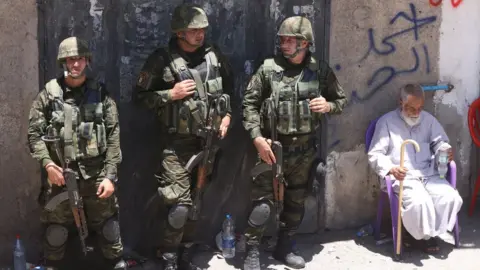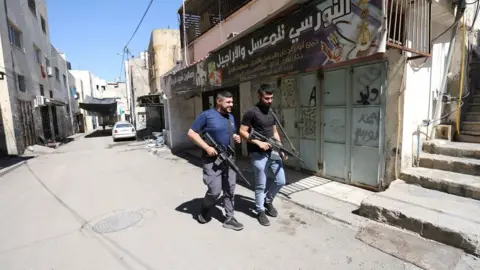Jenin: Abbas bids to reassert control with rare visit after Israeli assault
 Reuters
ReutersPalestinian President Mahmoud Abbas has paid his first visit in over a decade to Jenin in the occupied West Bank.
It comes a week after a massive Israeli military assault on the city's refugee camp.
The visit was a bid to reassert control by the Palestinian Authority (PA) leader amid the worst security and political crisis in the territory in two decades.
He pledged to rebuild the camp, which he called "an icon of struggle".
At the camp gates, where flags of the Palestinian militant group Islamic Jihad flew next to those of the internationally recognised PA, Mr Abbas arrived amid chaotic scenes.
He had flown to Jenin in a Jordanian military helicopter from his headquarters, 100km (62 miles) to the south in the city of Ramallah.
There was a huge armed deployment. PA security forces joined a thousand-strong unit of Mr Abbas' elite presidential guard to clear a path for the 87-year-old to enter the camp, parts of which remain devastated from Israel's air and ground assault.
 EPA
EPAUsing a stuttering microphone that repeatedly stopped working and made it hard for the crowd to hear, the Palestinian president spoke of defiance, calling Jenin camp "heroic" and saying that it "stood against the aggression and sacrificed its people for the homeland".
He also appealed for unity. "We came to say we are one authority, one state, one law, one security and one stability".
But, in a further sign of the collapse in public support for the PA, there were only a few hundred people in the crowd from among the urban refugee camp's 24,000 residents.
The PA was created during the Oslo peace accords of the 1990s, giving Palestinians limited self-governance ahead of a hoped-for transition to an independent state.
Now, many Palestinians view it as a security sub-contractor for Israel's military occupation of the West Bank, which is into its 57th year. Polls suggest most Palestinians now back armed resistance, believing the PA fails to protect them.
In the crowd for the speech by Mr Abbas - also known by his nickname Abu Mazen - was Jenin resident Mohammed al-Ghoul. He appealed for unity among all the Palestinian factions but complained that the PA forces stand aside when Israeli forces enter.
"Abu Mazen has brought the [Palestinian] military with him - there are snipers and troops," he said.
"If they were here like this when the occupation [Israeli] army raids, then [the Israelis] wouldn't dare to enter."
As Israel's military raids have intensified in the West Bank, Mr Abbas has vowed to end security co-ordination with Israel - a pledge he has made many times before but which is rarely acted on.
 EPA
EPAFurther inside the camp, militant gunmen still patrolled as Mr Abbas spoke and his forces did not venture further.
Palestinian sources told the BBC that the militant groups co-ordinated the president's visit with PA security forces. They said the militants on Tuesday allowed the PA forces to defuse improved explosive devices (IEDS) under streets, which had previously been laid to try to repel Israeli military raids.
The recent use of such IEDS against Israeli troops had been a key factor leading up to last week's Israeli operation.
In exchange for the co-ordination, the PA released around a dozen Palestinian militants from its prisons, according to the sources.
Mr Abbas also paid a short visit to lay a wreath at the nearby cemetery where nine of the 12 Palestinians killed last week are buried. Ten of the dead have been claimed by militant groups as members. One Israeli soldier was also killed.
The camp is largely in the control of militants calling themselves the Jenin Brigade. It is a loose alliance of armed organisations including the more established groups Hamas and Islamic Jihad. They are all listed by Israel and the West as terrorist organisations.
The past year has seen rising numbers of Palestinian armed attacks targeting Israelis, while Israel has intensified its deadly military raids in the West Bank. At least 160 Palestinians and more than 30 Israelis have been killed since January.
Israel's government said its two-day military operation last week was to stop Jenin camp being a "refuge for terrorism". It said it seized hundreds of guns and other weapons, including "advanced" improvised explosives.
It was Israel's biggest assault in the West Bank in two decades, involving drone strikes and armoured diggers causing massive destruction.
The United Nations accused Israel of using excessive force, while the Palestinian leadership called it a "war crime".

